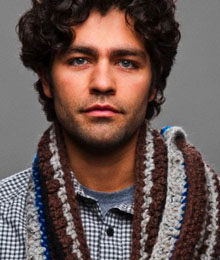Entourage: The Contemporary Definition of Cool
August 4, 2010 by Vito La Giorgia
Filed under Celebrity
 Glamour has our society swimming in a sparkling sea of delusion and vanity has a whole new face that can’t move its forehead. With this in mind it is no wonder HBO’s hit show Entourage has become so popular. It reflects powerful distractions that throw human beings off their personal course to achieve their full potential, including the procrastinator’s drug of choice that’s being smoked in 50 per cent of their episodes – marijuana. The creators of Entourage continue to master in the art of manipulating and exploiting human weakness.
Glamour has our society swimming in a sparkling sea of delusion and vanity has a whole new face that can’t move its forehead. With this in mind it is no wonder HBO’s hit show Entourage has become so popular. It reflects powerful distractions that throw human beings off their personal course to achieve their full potential, including the procrastinator’s drug of choice that’s being smoked in 50 per cent of their episodes – marijuana. The creators of Entourage continue to master in the art of manipulating and exploiting human weakness.
The team at Entourage has chosen not to shy away from the proverbial fast lane and the toxic consequences that their actors never take seriously. Also interesting is the real-world application of flirtation with this “road of spoils” or “fast-lane” lifestyle. This often tempts its patrons with an exciting taste for the senses that leads to a desire to continually live life in a way that ignores the inner conscience and its innate evolutionary response to avoid dangerous situations. One more note, most of the millions of viewers that tune in every week are not celebrities. Therefore, showcasing celebrities with golden parachutes is irresponsible when we consider the type of perverse behavior that this program glamorizes without repercussions.
Being bad is fun but eventually every undeserved high will let you down. The problem with Entourage is no one ever learns from any of their indiscretions. Invincibility is a façade that should not be glamorized in this impressionable and morally deficient society. Like the delusional Scarface philosophy suggests, “First you get the money, then you get the power, then you get women.” This is wrong on so many levels. Greed leads to megalomania, which leads to treating women like objects.
Females are constantly degraded on shows like Entourage. Some scenes are filled with female models acting as friends or acquaintances of the “fortunate foursome.” From movies and shows, to billboard fronts and magazine covers, Entourage continues to chip away at the female insecurity of the body by emphasizing the importance of looks and who and what they could get you. This, of course, results in our current unhealthy and vain society, which is driven by esthetically pleasing features. Vanity poisons the soul and recent technology allows it to actually put small doses of poison in the body to fight gravity. With children dying all over the world, here in Western society, gravity prevention gets more money thrown at it than any honest attempts to prevent hunger. Guilt has pushed women into undergoing breast augmentations and much more invasive surgeries, along with the rise of eating disorders. Their behaviour is motivated by the delusion that constantly reminds them that if they look better they’ll feel better, and the reminders of this are all around them. As any real man will tell you (assuming that some still do exist), the sexiest part of a woman’s body will always be her brain.
Whether you’re a good or bad guy, Entourage works so well because it entices men’s carnal desires with a pinch of morality in a way that lures a very large number of men and women. The show is a powerful message that is capable of much more than 30 innocent minutes of leisure time. The major negative impact on socialization that Entourage contributes to is an unnoticed immoral message of cool by way of sex, drugs, and greed. Yes, the Entourage boys might be bad-asses but does that make them good people?
Good people are becoming a rarity – greed is sucking the soul out of the planet and all its products, including us.
Jeremy Piven’s depiction of a talent agency tycoon personifies greed. Various groups have decorated him with awards for his portrayal of Ari Gold on Entourage. His character is guided by Sun Tzu’s philosophies in the book Art of War. He is the status-driven, empathy-lacking, mega-agent to the stars. He offends and offers a window into the world of a man who is in total control. By total control we mean totally controlled by greed, which has resulted in a dysfunctional marriage, an unhappy wife, one who uses Band-Aid psychology of a monetary fabric, in that his money pays for their lack of love and the evaporating time they spend together while he’s busy “mounting” the corporate ladder in Hollywood and abroad. Ari Gold is repugnance at its best.
The lead fantasy figure of the show is Vincent Chase (played by Adrian Grenier), a young desirable actor who possesses an effortless ability to stay cool in any situation. Then again, its probably more difficult to be un-cool when you’re driving a $300,000 car one minute and making out with two supermodels the next than it is to be cool. All this takes place while his three talentless lackeys try to avoid carpet burn as they ride his famous coattails into whatever “sticky” situation he gets himself into, hence the name Entourage.
There’s Drama, Vince’s older brother, a struggling actor whose hairline is receding just like the spotlight under which he used to thrive in Hollywood. Turtle is a chubby “neighborhood-guy” with charm and a serious pot addiction and “E” or Eric, is the only wholesome character in the program; then again, as the old saying goes, “Sleep with dogs, wake up with flees.”
These five characters add to the imbalance of morally sound programming versus everything else in contemporary North American media. The problem continues, the over-stimulation of entertainment has caused our sense receptors to yearn for more in order to get our fix, more sex, more vanity and more excitement. A good soul will have difficulty experiencing true freedom in a society that lacks a strong moral base, with all the social pressure to be bad, being good is becoming ever more arduous. Are there ever any tender moments in this program, in society? Yes, every so often they’ll embed a touch of love, camaraderie, honesty or humility, but not too much! Because those things don’t sell as a whole, although they do help gather a larger sample of viewers. Before these images can seep into our subconscience, the camera “smash-cuts” to a scene of drugs, sex, greed or glamour. Whenever the audience gets a drop of honesty or humility, it is quickly whisked away because the message that it must sell in order to stay at the forefront of the television industry runs contrary to altruistic and empathetic motives. This show is a reflection of our society in that the little good that’s left keeps on disappearing and is too soon forgotten.
Television picks up the tab that North American parents can no longer afford to pay. Less time at home leaves for less parenting, leaves for less guidance. Entourage can be overwhelmingly impressionable by triggering negative behaviour in its viewers. Technology is an advancement our generation can be proud of but it has its repercussions. As the Dalai Lama said, “With the ever-growing impact of science on our lives, religion and spirituality have a greater role to play in reminding us of our humanity.” The spouts of religion and spirituality have run dry; where are the sources coming from for this generation and future generations to taste, let alone rejoice in?
Since the 1960s, film and television have been and continue to be the most popular and influential forms of media culture in North America. Since then, advertisers have crafted more persuasive pitches, we’ve watched television glamorize sex, greed, vanity and violence on a whole new level. Films do everything television does, only on a larger scale. This just goes to show that creating popular media messages is very hard sell in our contemporary society. Shows like Entourage are part of a media tidal wave that is impossible for our minds to resist. It influences our attitudes, our behaviour and the ever-changing and often deceitful interpretation of what it means to be cool.









Comments
Feel free to leave a comment...
and oh, if you want a pic to show with your comment, go get a gravatar!